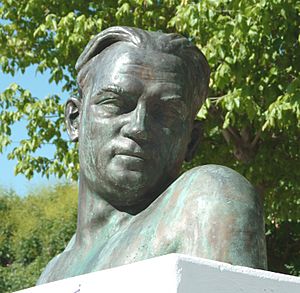Pablo Sorozábal facts for kids
Quick facts for kids
Pablo Sorozábal
|
|
|---|---|

Bust of Sorazábal in Madrid
|
|
| Born |
Pablo Sorozábal Mariezcurrena
18 September 1897 |
| Died | 26 December 1988 (aged 91) Madrid, Spain
|
Pablo Sorozábal Mariezcurrena (born September 18, 1897 – died December 26, 1988) was a Spanish composer. He wrote many different kinds of music, including zarzuelas (a type of Spanish musical play), operas, and pieces for orchestras. One of his most famous songs is "No puede ser".
He was born in San Sebastián, Spain, into a working-class family.
Contents
Early Life and Musical Training
Pablo Sorozábal began his music training in his hometown of San Sebastián. He then continued his studies in Madrid and Leipzig, Germany. Later, he went to Berlin. In Berlin, he chose to study composition with Friedrich Koch instead of Arnold Schoenberg, whose ideas he didn't agree with.
It was in Germany that Sorozábal first started conducting orchestras. Leading an orchestra became a very important part of his musical career.
Famous Musical Works
While in Leipzig, Sorozábal wrote several pieces for concerts. These include Suite vasca (1923), which featured a choir, and Symphonic Variations on a Basque Theme (1927). Later, he composed a sad march called Gernika (1966) for choir and orchestra.
His Siete Lieder (1929), which were songs set to poems by Heinrich Heine for a singer and orchestra, are considered some of his best works from his time in Germany. He also wrote two powerful songs for choir and orchestra: Maite (1946) and ¡Ay, tierra vasca! (1956). These songs are still very popular in his home region, the Basque Country.
Zarzuelas and Operas
Sorozábal's first stage show was Katiuska (1931). After that, he wrote about twenty zarzuelas. These musical plays are known for their beautiful songs, amazing orchestral music, and great storytelling.
Two of his most loved zarzuelas are La del manojo de rosas (1934), a funny story set in Madrid, and La tabernera del puerto (1936), a romantic tale set by the Atlantic Ocean. La tabernera del puerto includes the famous song "No puede ser." This song became popular around the world when Plácido Domingo sang it in the Three Tenors concerts.
Sorozábal also wrote a one-act opera called Adiós a la bohemia. This opera, based on a short story by Pío Baroja, is still very popular in Spain.
Challenges and Later Works
After the Spanish Civil War, Pablo Sorozábal faced some difficulties because of his liberal views. This meant that many of his later zarzuelas were first performed outside of Madrid or in smaller theaters in the city.
Some of these later works include Black, el payaso (1942), an ambitious and symbolic romance, and Don Manolito (1943), a musical about ski sports. Both of these shows starred the popular Basque singer Pepita Embil.
Sorozábal also composed music for movies that were not musicals. A notable example is the classic Spanish film Marcelino Pan y Vino (1955).
His time as the director of the Madrid Symphony Orchestra ended suddenly in 1952. This happened because he was not allowed to conduct Dmitri Shostakovich’s Leningrad Symphony.
Even though his musical comedy Las de Caín was performed in 1958, his opera Juan José had to wait a long time. It finally had a very successful concert performance in February 2009. A full stage production of Juan José was stopped during rehearsals in Madrid in 1979.
Pablo Sorozábal passed away in Madrid on December 26, 1988. His death marked the end of an era for the romantic zarzuela. His energy for theater, clever music, and strong dramatic style are considered among the best in the history of zarzuela. Many compare his talent to other great music theater composers of his time, like Kurt Weill.
Sources
extract from Christopher Webber's biography on zarzuela.net with permission
See also
 In Spanish: Pablo Sorozábal para niños
In Spanish: Pablo Sorozábal para niños

